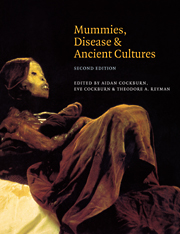Preface to the first edition
Published online by Cambridge University Press: 05 February 2015
Summary
Why mummies? That is the question we are often asked. How did an otherwise respectable physician and a senior member of the University of Oxford, whose field is modern language and literature, find themselves regarded as ‘the mummy experts’?
The story begins in Aidan's early medical years. He is cursed with the satiable curiosity of the elephant's child and always wants to know ‘why?’. Why are diseases the way they are? Were they always like this? Where did they come from? Under the influence of the nineteenth-century ideas of Darwin and Huxley, he worked out a series of theories that would explain how disease organisms evolved, how they changed during the different epochs of the development of human society, and how the interaction of these two streams of evolution resulted in our current infectious disease patterns. Eve, with her nonscientific background, found herself looking at these ideas with the cold and critical eye of an outsider, then helping with the sorting and organizing of theories – and so a partnership was born.
After Aidan's first two books on the evolution of infectious diseases (1963 and 1967), there was a hiatus of several years. Then came two casual conversations, which led to the present line of research and the present book. At a meeting of the American Association of Physical Anthropologists in Boston in 1971, Lucile St. Hoyme of the Smithsonian Institution remarked: ‘Aidan, why don't you apply for a grant from the Smithsonian to study in some area where you could find facts to back up your theories? We have local currency funds available in at least seventeen countries’. She listed them, and the obvious one that would provide a fertile field for research was Egypt. Aidan applied for and received a grant to go to Egypt on a reconnaissance trip to investigate the possibility of organizing a project for the autopsy of large numbers of mummies, thus obtaining facts to back up his, until then, largely speculative ideas.
- Type
- Chapter
- Information
- Mummies, Disease and Ancient Cultures , pp. xvii - xviiiPublisher: Cambridge University PressPrint publication year: 1998



